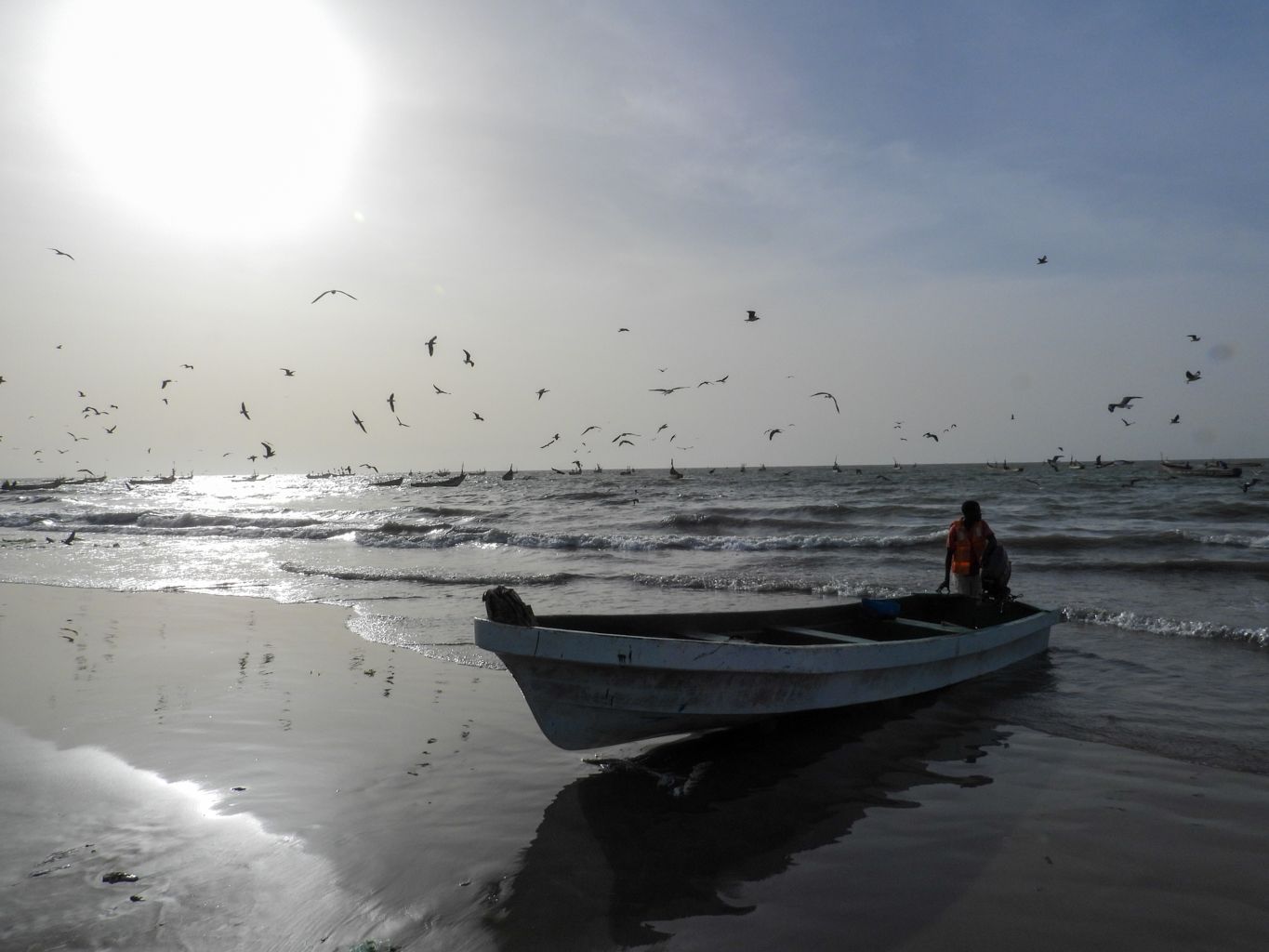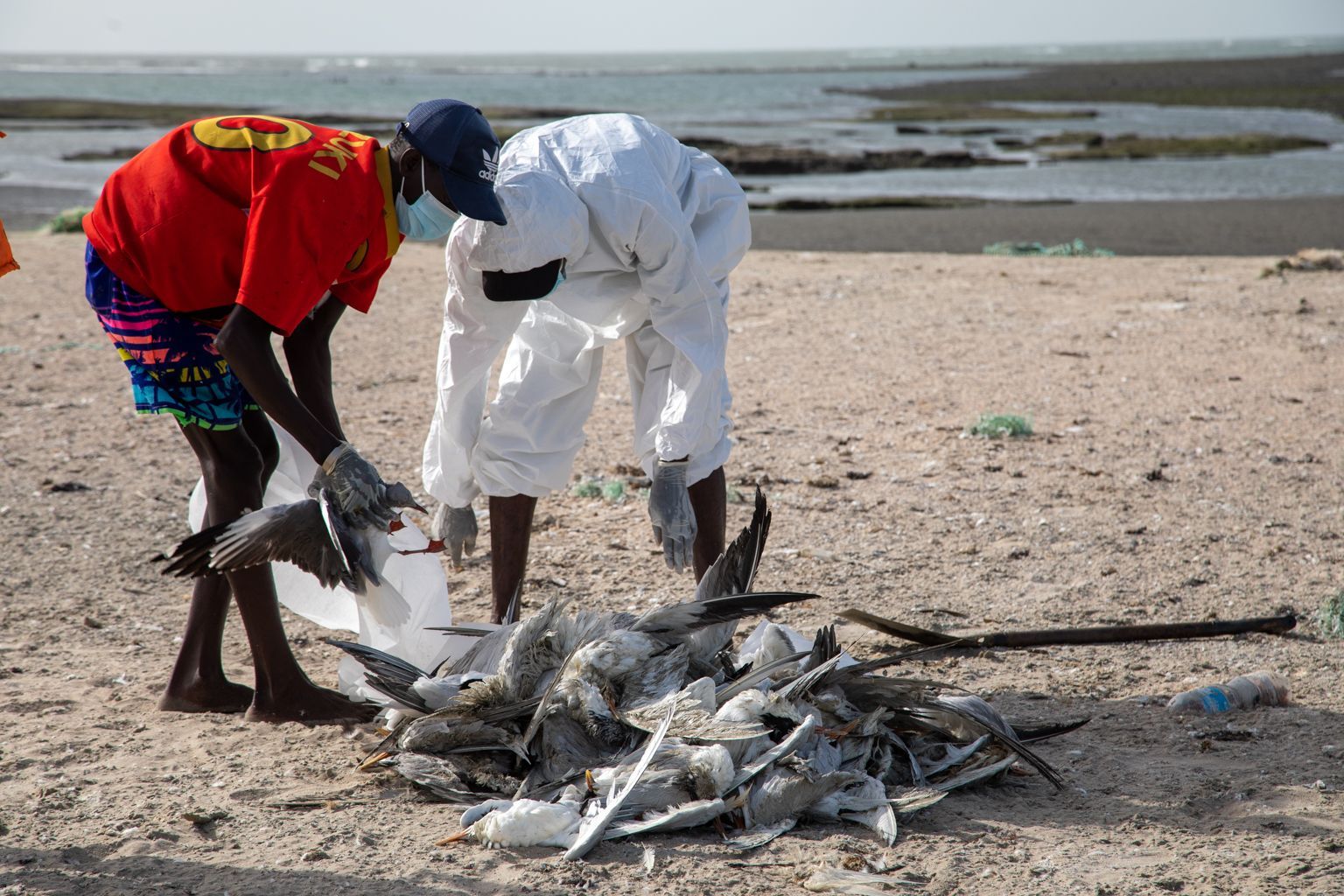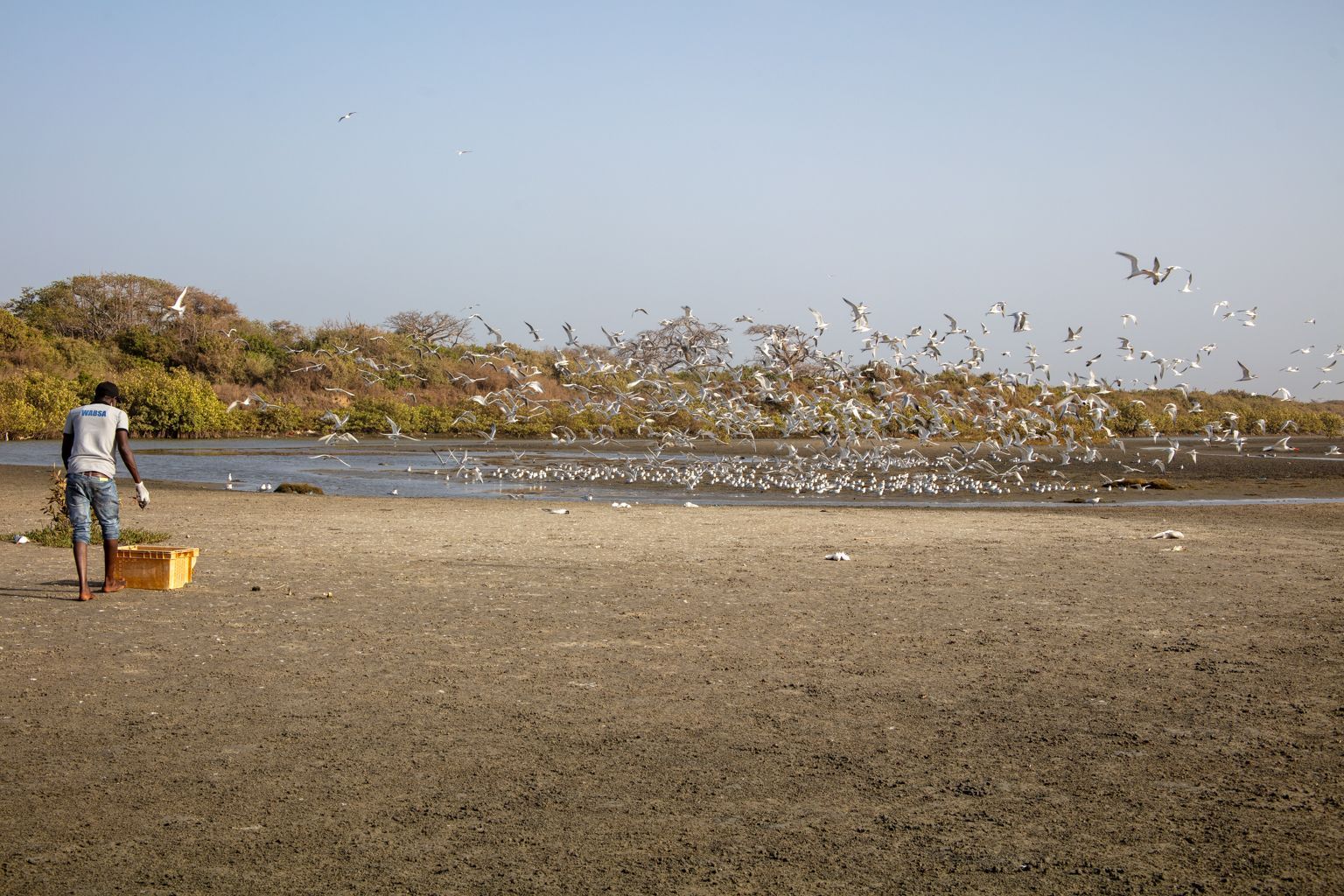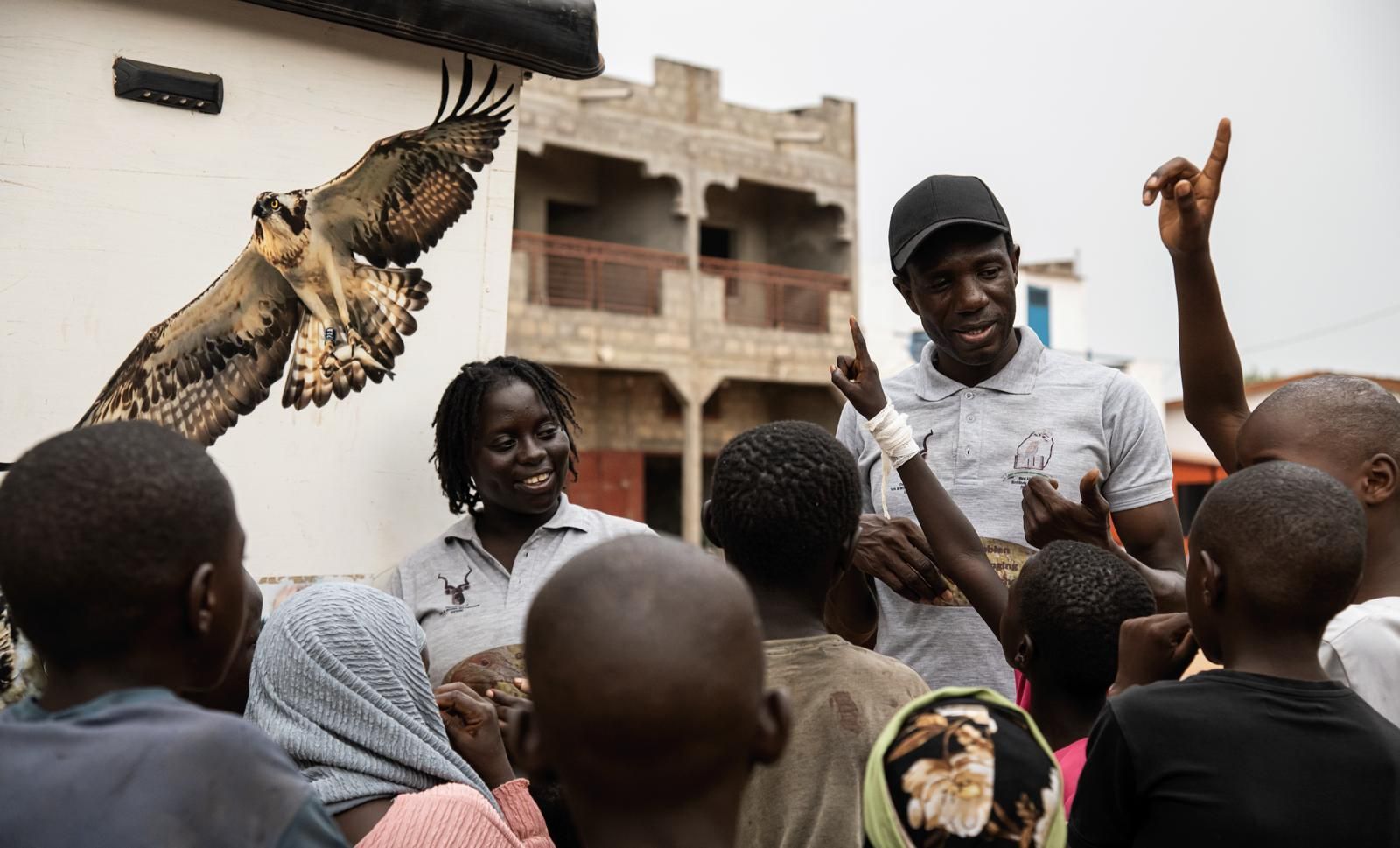Conservations Without Borders’ call for action against bird flu in The Gambia results in £125,000 DEFRA contribution
When Conservation Without Borders’ (CWB) Flight of the Osprey (FOTO) expedition arrived in The Gambia, they did so just as a bird flu outbreak was announced in the country. Having seen with her own eyes the challenges for the Gambian response teams on the front line, Sacha Dench and her team were determined to help. Here’s what happened next.
Arriving in The Gambia, the FOTO team expected to be covering the story of the country’s coastal islands, which are slowly disappearing due to rising sea levels, accelerated by climate change and nearby sandmining. But, while the islands are no doubt an important story, what they discovered was far more urgent.
“We found ourselves with the Gambians at the discovery of an outbreak of bird flu, and whilst it was really shocking to see birds sick, dying and dead of bird flu, what was almost more shocking was realizing that these locals had been given the enormous job of defending the country, but also the flyway, against an outbreak with no support. They had very little training, no funding for adequate surveillance, control and disposal of infected birds, and field teams had insufficient PPE, and no clear channel for expert guidance and support with practical questions,” Sacha said.
The team heard reports from fishermen that there were dead and dying birds on an island, but the local team was struggling just to find the funds for the fuel to get out there and do the cleanup.
“There’s a lack of finance for the rangers to come over here for regular monitoring. Since this outbreak we have only come here once, because of lack of finance. We would have loved to come here every day to monitor this area to minimise this,” Fagimba Camara, head of research at West African Bird Study Association, said.

Mass migratory water bird death
Having arranged the funds for fuel, the FOTO team headed with the local field team to the island where they were confronted with the harsh realities of bird flu.
More than 10,000 migratory water birds have now died in this region alone, including hundreds of West African Crested Terns. Many others will have become infected and carried the disease with them on their migrations towards Europe. On top of the practical issues, there is the communication challenge of reaching the public to stop them picking up sick birds to take home to heal or eat and risk spreading it to domestic fowl, or even becoming infected themselves. As the outbreak grows, there is also a need to recruit and train volunteers to help monitor and mitigate the spread.
Since the outbreak in The Gambia was brought to light in international media, other countries – both in the Global North and Global South - have reported challenges caused by lack of support, as well as confusion on where to turn, to share data and learnings or for advice.
Other failings included government departments focusing only on agricultural impacts on domestic fowl and not on wild birds. There is also too much pressure on underfunded NGOs to handle the outbreak in priority sites for wild waterbirds, and most managed sites have no bird flu response plan in place. While UN entities and national governments have some agreements in place, the practical reality is that the obligations for many countries are impossible to fulfil.
A decision was made for CWB to create a Crowdfunder to provide immediate support, which quickly hit the £1,500 target. These funds, now donated to WABSA, allow them to continue their work safely and effectively. Helping the team to save many birds and reduce the threat of migratory birds spreading the pandemic to other countries along the flyway.

A warning cry we can't ignore
But Sacha knew it was a short-term solution. As she sat in the back of the FOTO expedition vehicle she drafted an open letter, which was sent to conservation scientists and practitioners.
The letter requested for international governments to provide essential funds, equipment, and guidance for countries in the Global South, like The Gambia, to respond to outbreaks. This would allow field teams to monitor, risk assess, dispose of corpses safely, and seek ongoing advice as the situation evolves.
By adopting a proactive rather than reactive approach, losses to industries such as agriculture and tourism would be minimised, not just in countries where the outbreaks occur but in other countries along the flyways.
“In summary, wild birds are a good indicator of the health of ecosystems. The situation described in The Gambia and other countries and the shocking losses to wild bird populations are a warning cry we mustn't ignore,” it concluded.
A total of 43 conservationists and conservation scientists signed, and it came to the attention of English financer and Environmentalist Ben Goldsmith. He took the issue to The Department for Environment, Food and Rural Affairs (DEFRA).
DEFRA then engaged with officials in The Gambia and the UN Food and Agriculture Organisation (FAO), who have a strong presence in the region and have already provided some support, to see what financial and technical assistance the UK could offer.
At the end of June, CWB received a letter from The Rt Hon Lord Benyon, Minister for Biosecurity, confirming that DEFRA would provide further assistance.
“We have now agreed a contribution of £125,000 Official Development Assistance (ODA) funding this financial year to bolster the FAO’s technical assistance and other support to The Gambia, which will strengthen the country’s bird flu prevention, preparedness, and response capacity in areas such as surveillance and reporting,” he said.
“The Animal and Plant Health Agency (APHA), one of Defra’s Arms’ Length Bodies, will also be able to offer remote technical support as needed, including sharing best practice on laboratory diagnostics for bird flu. We are also considering potential longer-term support for The Gambia as part of our wider ODA work in West Africa on strengthening animal health systems,” he added
Others stepping up
In the meantime, other organisations had also been stepping forward to offer their assistance. Shipping company Maersk, who have operations in the country, donated packages of PPE to the WABSA office.
“In addition to our dedication to protecting the environment, we place the highest priority on health, safety, security, and environmental practices (HSSE) within our operations. We are proud to extend our support to Conservation Without Borders, as their tireless efforts to safeguard wildlife and their habitats resonate deeply with us. Together, we can make a positive impact on our planet and ensure a brighter future for generations to come,” Yankuba Jallow, Managing Director at Maersk Gambia Limited said.
DS Medical also donated PPE, the company’s managing director Richard Bourke stated: “While humanitarian issues are currently in focus, we must not neglect the far-reaching problems of our ecological system across the globe, which are also important to the planet.”

WABSA conservator Awa Joof admitted that it had been a difficult task, “looking at birds dying in large numbers” and that the team were grateful for all the support. “We cannot thank you enough,” she said.
While there remains so much more to do tackling bird flu, this has shown that addressing an issue and highlighting stories, which may otherwise go unheard, can bring people together from different organisations and companies to create positive change.
“What's really inspiring is that there are organisations that are prepared to step up when they need to on an issue like bird flu, which would protect everybody, all of us from Northern Europe down into West Africa. We just need to figure out a better way of giving them the right support in the future,” Sacha said.


